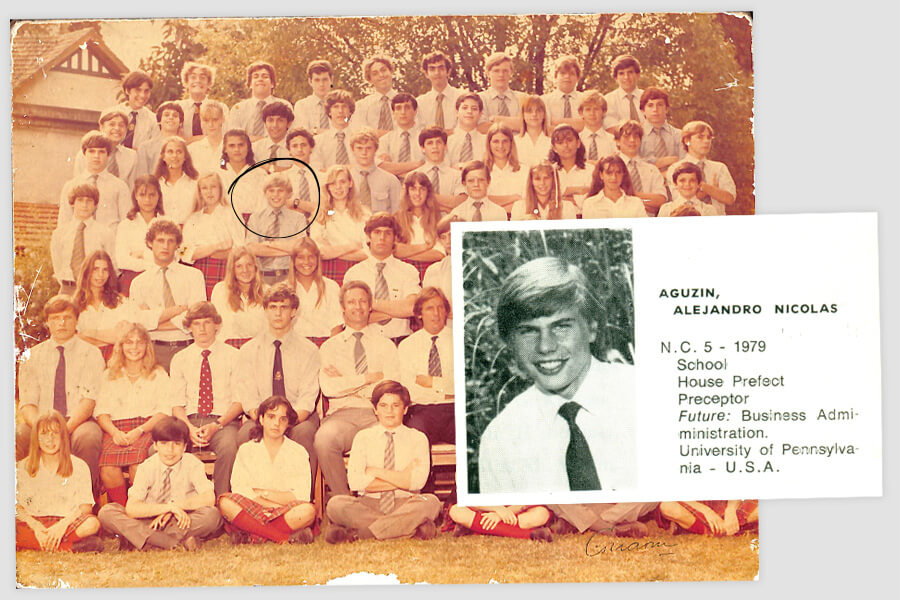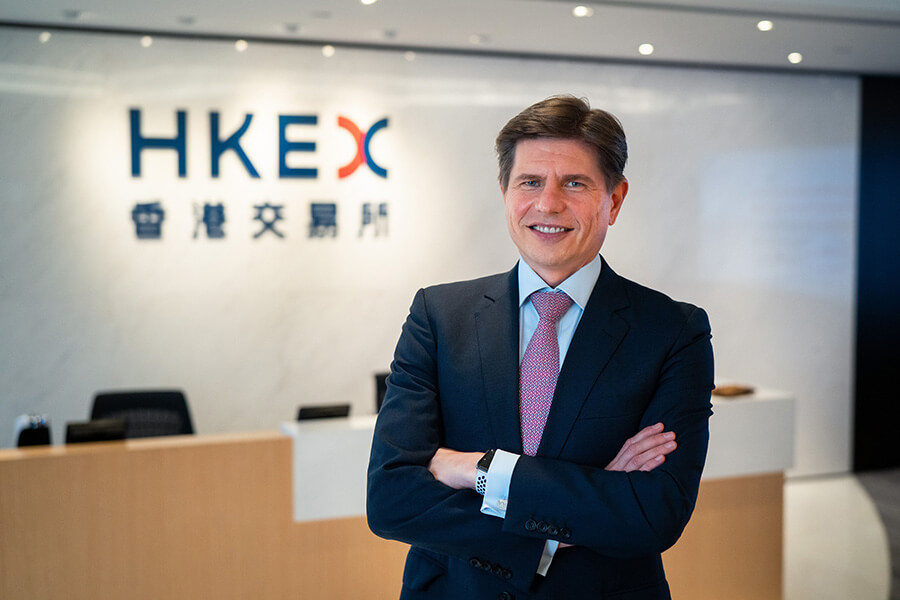In February, Hong Kong Exchanges and Clearing Limited (HKEX) announced the name of their new CEO. For the first time in the history of the Exchange, the CEO was an international executive, and to the pride of the whole St George’s College community, that executive was an Old Georgian: Nicolás Aguzín (Camada 1985).
Nicolás moved from thinking that he was going to be a doctor, like his father, to realising that his passion was business. That’s why, when he ended his studies at St George’s College, he entered Wharton’s business school of the Pennsylvania University.
Once he graduated, he began his extraordinary career at JP Morgan, where he worked in different roles over the course of 31 years until he got the unexpected opportunity to make history at HKEX, one of the most important stock exchanges in the world and which is growing at a vertiginous rate – its revenue increased seven fold between 2000 and 2020.
Nicolás has generously dedicated part of his busy time to tell us about the challenges that he expects to face and review his experience at the school.
How do you remember your time in St George’s College?
I came to St George’s 42 years ago, when I was 10 years old. The school became my family, and my classmates became my brothers, and they still are. We’re still in touch on a WhatsApp group!
I was at the school during the Falklands War, and attending a British and English speaking school, in Argentina, was a very interesting experience. We all got along great, and felt very connected, British and Argentinians alike. I have fond memories of the collegiate atmosphere at the school despite the troubles outside its walls.

How do you think St George’s College influenced your career? What importance do you think that going to a school with an international background has in the development of a “citizen of the world” mindset?
St George’s influenced me in three main ways. First, since of the age of 10 I lived in an international and English speaking environment, with students from all around the world, which taught me about multiculturalism and allowed me to pursue an international career.
Second, in that English school system, the students help run the school, and I learned how to follow other classmates and leaders, and take instructions from them. Then, third, as I became a senior student, I in turn learned how to lead. Older students had to be accountable to, and for, the younger students, and those skills were useful in leading big organisations later in my life. You have to know how to respect leadership as well as how to be respected as a leader.
After graduation, what was your career choice and how did you start your professional career?
I always thought I’d become a doctor, following in my father’s footsteps. But then I discovered I had some business savvy. For example, I would go to Paraguay, buy watches and bring them back to sell at the school at a small profit. I also had an adventurous spirit, and I began to doubt my plan to be a doctor. I decided to go to the US to study business, which was a huge adventure. I did my research on different schools, St George’s helped me with all of the US entrance exams, and I was accepted into the Wharton School of the University of Pennsylvania. Then, straight out of university, I joined JP Morgan, and I was with them for 31 years before I got this opportunity with HKEX.
Which were your main difficulties during your whole career and how did you solve them?
A big challenge in any career is understanding that you need to evolve and adapt as a person as you go through the different stages. Early on, you need to be competent and intelligent, and you become an expert in your particular topic. It involves hard work within a small group of people. In the early stages your work is all consuming, often at the sacrifice of your health and social life.
As you progress in your career and manage bigger teams, it’s not just intelligence but rather emotional intelligence that becomes important. You have to lead the people around you to achieve results, and you succeed through their hard work. At the same time other factors, including family and friends, and physical and emotional wellbeing, take on greater importance.
We must acknowledge these shifts and learn to adjust to them in order to have a long and successful career.
How was your experience as external director of Mercado Libre?
Mercado Libre is the number one company in Latin America today, and it’s a very unique company in the way it has changed how people transact across the region. My experiences there, with a relatively young management group, taught me many things, which I have applied in other roles. Now I’m at HKEX, a market place for financial assets rather than for goods and services, but both HKEX and Mercado Libre are marketplace investing for the long term, and focused on the client. So in this way Mercado Libre was a perfect complement to what I am doing today.
You’ve just been named as Hong Kong Exchanges and Clearing Limited CEO. How did you get there?
I was very happy at JP Morgan, and was preparing for a move to London, as my role had become an international one. We’d already enrolled our children in a school in London. Then I got a call from an executive search agency, asking if I’d be interested in this role at HKEX. I met with a few of the directors, and they convinced me to take this path.
I made the change for three reasons. First, I simply love Hong Kong.
Second, HKEX is a huge company, one of the world’s leading exchange groups, it’s vibrant and growing, and in the middle of what I call the big bang of finance. This is where the activity will be over the next 10 to 15 years as China’s capital markets become more international, with investors going both, in and out of China. This is where the largest market capitalisation creation in the history of humanity will happen, and I have a chance to be the CEO of HKEX at the centre of that!
What do you think are the principal challenges that you will have to face?
The biggest challenges ahead are geopolitical tensions. People are less willing to listen and understand each other than in the past. And that brings me to the third reason I wanted to take this role.
I believe the connection and interaction between countries and companies internationally is critical to the progress of global harmony as a whole. The more we interact, the less chance there is for conflict. Anything I can do to make sure that we have stable, development and growth with a rational relationship between East and West is, in my mind, an important role. I think I can have an impact in that sense here at HKEX.
How do you deal with the cultural differences that may exist on a laboral, personal and professional level?
I’ve learned to be very aware of and focused on the small cultural differences, and to do my best to respect them, even when they don’t seem important to me. For example, I once attended a meeting in Korea with my boss and he was not wearing a suit jacket, just a shirt and tie. The Koreans were very offended by that. This would mean nothing in many other places, but to them it was a sign of disrespect, and I learned from that. Across Asia there are many such things, from crossing your legs or not, to how you use your chopsticks, accepting business cards with both hands instead of one, to who you can shake hands with and who you don’t touch. In China, the market numbers on the screens are red going up, and green going down, opposite of the West. I’ve learned to be alert to, and respect, these differences and use them to try and understand people from different backgrounds.
Many pupils and graduates are reading this article. What advice would you give them? What would you tell someone who wants to make his career in finance?
A lot of people say that to be successful you have to follow your passion. I will tweak that a little bit. To be very successful you have to develop your passion. And to develop your passion there are four things you need to do.
Number one is competence. You have to be sure that you become very competent at something, so try to choose something that you are good at. If you’re good at math, then something analytical is going to be good. If your strength is interpersonal skills, something that develops that social side is probably going to be very good. But having competence is very important to make sure that your passion develops.
Number two, do something where you have a purpose. It’s not just about what I am going to be good at, but it has to be something that you feel that contributes to our society and to people around you.
Number three, do something where you can grow and you can see progress and growth.
Number four, do something you can do with a great community of people supporting you and around you. Doing something that you do in a community is very important. So to be able to develop that passion you need those four things and if you achieve all of these, I guarantee that whatever you do, you’re going to be very passionate about it.











